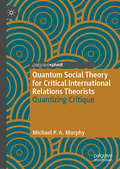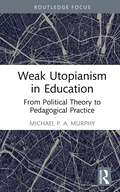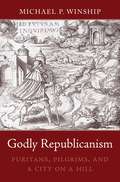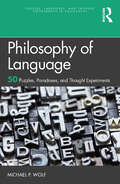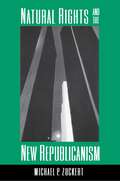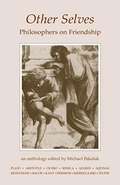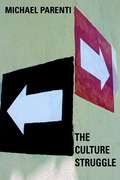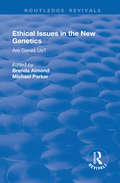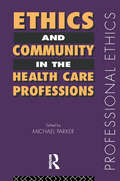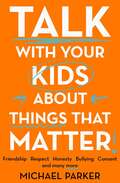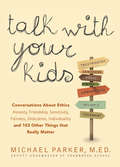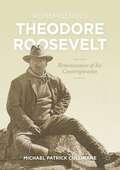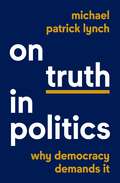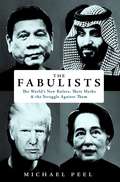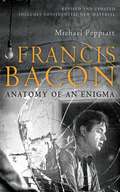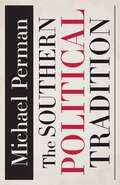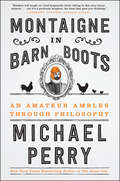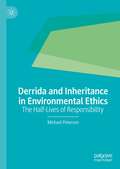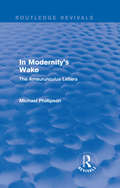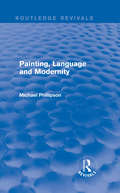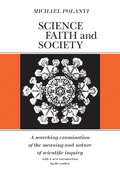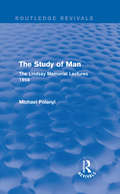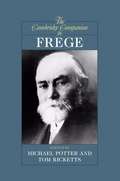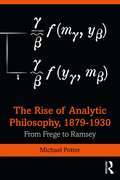- Table View
- List View
Quantum Social Theory for Critical International Relations Theorists: Quantizing Critique (Palgrave Studies in International Relations)
by Michael P. MurphyThis book examines the crossroads of quantum and critical approaches to International Relations and argues that these approaches share a common project of uncovering complexity and uncertainty. The “quantum turn” in International Relations theory has produced a number of interesting insights into the complex ways in which our assumptions about the physics of the world around us can limit our understanding of social life. While critique is possible within a Newtonian social science, core assumptions of separability and determinism of classical physics impose limits on what is imaginable. The author argues that by adopting a quantum imaginary, social theory can move beyond its Newtonian limits, and explore two methods for quantizing conceptual models—translation and application. This book is the first introductory book to quantum social theory ideas specifically intended for an audience of critical International Relations.
Weak Utopianism in Education: From Political Theory to Pedagogical Practice (Rethinking Education)
by Michael P. MurphyIn the light of the structural dangers of revolutionary change highlighted in the political theory of Giorgio Agamben, this book joins a lively debate in philosophy of education on weak utopianism as an approach that foregrounds and respects the educational potentiality of teachers and students. Utopian moves in education call for revolutionary changes in pedagogical practice in pursuit of a particular vision of the good. Whether grounded in emancipatory politics, technological enthusiasm, or another social movement, utopian moves are seductive in their promise of a better alternative. Weak Utopianism in Education draws together philosophy of education, political theory, scholarship of teaching and learning research, and utopian thought to advocate for a modest and humble approach to change. The theoretical foundation of weak utopianism opens space for educator’s personal convictions and teaching philosophies to tinker with their own pedagogical practices. The book creates a common conceptual meeting ground for philosophers and practitioners in education.
Godly Republicanism
by Michael P. WinshipPuritans did not find a life free from tyranny in the New World-they created it there. Massachusetts emerged a republic as they hammered out a vision of popular participation and limited government in church and state, spurred by Plymouth Pilgrims. "Godly Republicanism" underscores how pathbreaking yet rooted in puritanisms history the project was. Michael Winship takes us first to England, where he uncovers the roots of the puritans republican ideals in the aspirations and struggles of Elizabethan Presbyterians. Faced with the twin tyrannies of Catholicism and the crown, Presbyterians turned to the ancient New Testament churches for guidance. What they discovered there-whether it existed or not-was a republican structure that suggested better models for governing than monarchy. The puritans took their ideals to Massachusetts, but they did not forge their godly republic alone. In this book, for the first time, the separatists contentious, creative interaction with the puritans is given its due. Winship looks at the emergence of separatism and puritanism from shared origins in Elizabethan England, considers their split, and narrates the story of their reunion in Massachusetts. Out of the encounter between the separatist Plymouth Pilgrims and the puritans of Massachusetts Bay arose Massachusetts Congregationalism.
Philosophy of Language: 50 Puzzles, Paradoxes, and Thought Experiments (Puzzles, Paradoxes, and Thought Experiments in Philosophy)
by Michael P. WolfThis book offers readers a collection of 50 short chapter entries on topics in the philosophy of language. Each entry addresses a paradox, a longstanding puzzle, or a major theme that has emerged in the field from the last 150 years, tracing overlap with issues in philosophy of mind, cognitive science, ethics, political philosophy, and literature. Each of the 50 entries is written as a piece that can stand on its own, though useful connections to other entries are mentioned throughout the text. Readers can open the book and start with almost any of the entries, following themes of greatest interest to them. Each entry includes recommendations for further reading on the topic. Philosophy of Language: 50 Puzzles, Paradoxes, and Thought Experiments is useful as a standalone textbook, or can be supplemented by additional readings that instructors choose. The accessible style makes it suitable for introductory level through intermediate undergraduate courses, as well as for independent learners, or even as a reference for more advanced students and researchers. Key Features: Uses a problem-centered approach to philosophy of language (rather than author- or theory-centered) making the text more inviting to first-time students of the subject. Offers stand-alone chapters, allowing students to quickly understand an issue and giving instructors flexibility in assigning readings to match the themes of the course. Provides up-to-date recommended readings at the end of each chapter, or about 500 sources in total, amounting to an extensive review of the literature on each topic.
Natural Rights and the New Republicanism
by Michael P. ZuckertIn Natural Rights and the New Republicanism, Michael Zuckert proposes a new view of the political philosophy that lay behind the founding of the United States. In a book that will interest political scientists, historians, and philosophers, Zuckert looks at the Whig or opposition tradition as it developed in England. He argues that there were, in fact, three opposition traditions: Protestant, Grotian, and Lockean. Before the English Civil War the opposition was inspired by the effort to find the "one true Protestant politics--an effort that was seen to be a failure by the end of the Interregnum period. The Restoration saw the emergence of the Whigs, who sought a way to ground politics free from the sectarian theological-scriptural conflicts of the previous period. The Whigs were particularly influenced by the Dutch natural law philosopher Hugo Grotius. However, as Zuckert shows, by the mid-eighteenth century John Locke had replaced Grotius as the philosopher of the Whigs. Zuckert's analysis concludes with a penetrating examination of John Trenchard and Thomas Gordon, the English "Cato," who, he argues, brought together Lockean political philosophy and pre-existing Whig political science into a new and powerful synthesis. Although it has been misleadingly presented as a separate "classical republican" tradition in recent scholarly discussions, it is this "new republicanism" that served as the philosophical point of departure for the founders of the American republic.
Other Selves: Philosophers on Friendship
by Michael Pakaluk"Friendship, that pervasive, everyday, and subtle matter of our most intimate personal life, has rarely been accorded its due. Michael Pakaluk has retrieved the thoughts of our greatest thinkers on the subject and collected them into a handsome and handy volume. . . . A splendid book!" --M. M. Wartofsky, Distinguished Professor of Philosophy, Baruch College, City University of New York
The Culture Struggle
by Michael ParentiOne of America's most astute and engaging political analysts, Michael Parenti shows us that culture is a changing process and the product of a dynamic interplay between a wide range of social and political interests. Drawing from cultures around the world, Parenti shows that beliefs and practices are readily subjected to political manipulation, and that many parts of culture are being commodified, separated from their group or communal origins, to be packaged and sold to those who can pay for them. Folk culture is giving way to a corporate market culture. Art, science, medicine, and psychiatry can be used as instruments of cultural control, and even marriage, the "foundation of society," has been misused by heterosexuals across the centuries.Using vivid examples and riveting arguments throughout, ranging from the everyday to the esoteric, and penned with eloquence and irony, The Culture Struggle presents a collection of snapshots of our time.
Ethical Issues in the New Genetics: Are Genes Us?
by Michael ParkerThis title was first published in 2003.Developments in genetic science are opening up new possibilities for human beings; both the creation and the shaping of human life are now possible in the laboratory. As these techniques develop, questions are increasingly asked about how far everything that is scientifically possible should - morally, legally and socially - be pursued. Whilst much attention and policy-making has focussed on the development of regulation of technologies affecting human reproduction, regulation where plants and animals are concerned is much more limited. In this book, developments in genetics are addressed in the broad sense by an international range of contributors. This includes not only issues such as eugenics and the modification of the human embryo, but also the genetic modification of plants and animals in the pursuit of commerce, agriculture and biomedical research.  This book is published in association with the Society for Applied Philosophy
Ethics and Community in the Health Care Professions (Professional Ethics)
by Michael ParkerThe concept of community is increasingly the focus of political argument in Britain, the United States and elsewhere around the world. The sense people have of belonging to coummunities provides a powerful motivation which continues to affecct the political and social face of the world. Recently, debate about the relationship between individuals and their communities has become central to the making of both, American and European social policy. In the United Kingdom this is especially apparent in the area of health care, where ideas of community have informed recent legislation concerning community care, community health trusts and the Children Act among others. This volume explores the focus of interest in community and the emerging theoretical oppostion between communitarianism and liberalism, as well as the practical, theoretical and ethical issues relating to community in the health care professions, including a discussion of the health service as Civil Association, an analysis of liberal and communitarian views on the allocaiton of health care resources, an exploration of the use of genetic information and an examination of health care decision making for incapacitated elderly patients.
Talk With Your Kids About Things That Matter: A must have guide to consent, bullying, fake news and more
by Michael ParkerWhat makes a person good? Is it their impeccable table manners? Whether they participate in protests? The way they treat the waiter?Talk to Your Kids About Things That Matter is the go-to guide for navigating ethics in the 21st century. In a post-Trump, post-truth world, the lines between right and wrong are increasingly blurred and ethics matter more than ever. More of us are questioning the world that we live in and what is our role inside it. Inside this book you&’ll find over 100 conversation starters for creating meaningful, thought-provoking discussions. From Plato to veganism, cancel culture to consent, and politics to basic kindness, these topics are set to engage, inspire, and even divide. It&’s the perfect accompaniment for road trips, Sunday afternoon drinks, family dinners or even a first date. Designed to have no real answer, but rather, stir even more questions, this provocative and deeply engaging book will kick your philosophical gears into action. How to be a Good Human encourages readers to dig deeper, put yourself in others&’ shoes, and be the best human you can be.
Talk With Your Kids: Conversations About Ethics -- Honesty, Friendship, Sensitivity, Fairness, Dedication, Individuality -- and 103 Other Things That Really Matter
by Michael ParkerA guide for parents to help their children better understand the world around them by helping them think through the questions they face regarding honesty, friendship, sensitivity, fairness, dedication, individuality and 103 other character-building issuesMany families and almost all schools spend a great deal of time developing children academically, but studies show tht scholastic achievement is not the only key to future success. Developing non-cognitive skills, which children often learn from their parents, is equally relevant.Talk with Your Kids prompts thoughtful and effective discussion between parents and children by posing 109 open-ended questions. Many of the questions reflect situations immediately relevant to kids, such as cyber-bullying, cheating in school or in sports, accepting differences, illegal music downloads, what defines lying, and making choices about drugs and sex.Other questions ask kids to consider larger dilemmas, such as medical ethics and medical testing, declaring war, crime and punishment, eating meat, and more. Parker also offers suggestions to parents on how to keep the conversations going and encourage kids to think more deeply about an issue. Throughout the book are questions based on the theories of famous ethicists and philosophers, including John Stuart Mill, Immanuel Kant, Thomas Hobbes, and Jean Jacques Rousseau.Best-selling parenting books such as How Children Succeed and Nurtureshock emphasize the importance of strong values in a child. The conversations in Talk with Your Kids help parents achieve this goal.
Remembering Theodore Roosevelt: Reminiscences of his Contemporaries (The World of the Roosevelts)
by Michael Patrick CullinaneThis book sheds new light on the life and times of Theodore Roosevelt, drawing on a remarkable set of oral histories gathered in the 1950s from those who knew him. Remembering Theodore Roosevelt presents fourteen intimate interviews with Roosevelt’s friends, family, and contemporaries. Never before published, the transcripts reveal colorful details about the infamous Rough Riders, the political scene in New York City, the lives of his extended family, including the Hyde Park Roosevelts Franklin and Eleanor, and how the former president inspired successive generations. The book benefits from the author’s discerning annotations and commentary that provide the reader with lesser-known facts and a full appreciation of the oral history project.
On Truth in Politics: Why Democracy Demands It
by Michael Patrick LynchThe &“philosopher of truth&” (Jill Lepore, The New Yorker) shows why truth is an essential democratic value—and how it can be strengthenedDo any of us really care about truth when it comes to politics? Should we? In a world of big lies, denialism, and conspiracy theories, democracies are experiencing two interlocked crises: a loss of confidence in democracy itself and the growing sense among many that politics is only about power—not truth. In this book, Michael Patrick Lynch argues that truth not only can—but must—matter in politics. He shows why truth is an essential democratic value—a value we need to sustain our democratic way of life—and how it can be strengthened.Despite evidence that people are rarely motivated by truth when it comes to politics, On Truth in Politics argues that this isn&’t inevitable. Accessibly written and rigorously argued, it draws on the American pragmatist tradition to develop an original theory of the nature and value of truth in the messy world of politics. Contrary to the belief of many, political beliefs can be true or false. But if democracy is to continue to be a space of reason and not just an arena of power, we must build a better infrastructure of knowledge, including stronger schools and media, and renew our commitment to science and history.A vital and timely book, On Truth in Politics makes an original case for why democracy cannot survive without truth.
The Fabulists: The World’s New Rulers, Their Myths and the Struggle Against Them
by Michael PeelDemagogues and authoritarians are flourishing in this modern age of political myth. They exploit our fears and fantasies. Exposing the fictions that these new rulers use to take and keep control has never been more urgent – and people risk their careers, liberty or even their lives to do so. In this revealing and richly reported book, international correspondent Michael Peel illuminates the surprising parallels between leaders, movements and their supporters who have thrived using potent but questionable stories. From Aung San Suu Kyi&’s Myanmar to Rodrigo Duterte&’s bloody drugs crackdown in the Philippines, and from Britain&’s struggle over Brexit to Syria&’s civil war, he probes the patterns in narratives that too often serve the interests of the chosen few. Above all, Peel shows the extraordinary and sometimes dangerous steps courageous people take to challenge these fabulists – and the treacherous paths they lead us down.
Francis Bacon: Anatomy of an Enigma (Cla.de.ma Ser.)
by Michael PeppiattFrancis Bacon was one of the most powerful and enigmatic creative geniuses of the twentieth century. Immediately recognizable, his paintings continue to challenge interpretations and provoke controversy. Bacon was also an extraordinary personality. Generous but cruel, forthright yet manipulative, ebullient but in despair: He was the sum of his contradictions. This life, lived at extremes, was filled with achievement and triumph, misfortune and personal tragedy. In his revised and updated edition of an already brilliant biography, Michael Peppiatt has drawn on fresh material that has become available in the sixteen years since the artist's death. Most important, he includes confidential material given to him by Bacon but omitted from the first edition. Francis Bacon derives from the hundreds of occasions Bacon and Peppiatt sat conversing, often late into the night, over many years, and particularly when Bacon was working in Paris. We are also given insight into Bacon's intimate relationships, his artistic convictions and views on life, as well as his often acerbic comments on his contemporaries.
The Southern Political Tradition: Poems (Walter Lynwood Fleming Lectures in Southern History)
by Michael PermanIn The Southern Political Tradition, the distinguished southern historian Michael Perman explores the region's distinctive political practices and behaviors, primarily resulting from the South's perception of itself as a minority under attack from the 1820s to the 1960s. Drawing on his extensive research and understanding of southern politics, Perman singles out three features of the area's political history. He calls the first element "The One-Party Paradigm," a political system characterized by one-party dominance rather than competition between two or more. The second feature, "The Frontier and Filibuster Defense," illustrates a dramatic, preemptive response within Congress to any threat to the region's racial order. And in the third, "The Over-Representation Mechanism," Perman describes the skillful manipulation of institutional mechanisms in Congress that resulted in greater influence than the region's relatively small population warranted.This anomalous tradition has all but disappeared since the Civil Rights Act of 1964 and the Voting Rights Act of 1965. The Southern Political Tradition offers an insightful and provocative perspective on the South's political history.
Montaigne in Barn Boots: An Amateur Ambles Through Philosophy
by Michael PerryThe beloved memoirist and bestselling author of Population: 485 reflects on the lessons he’s learned from his unlikely alter ego, French Renaissance philosopher Michel de Montaigne."The journey began on a gurney," writes Michael Perry, describing the debilitating kidney stone that led him to discover the essays of Michel de Montaigne. Reading the philosopher in a manner he equates to chickens pecking at scraps—including those eye-blinking moments when the bird gobbles something too big to swallow—Perry attempts to learn what he can (good and bad) about himself as compared to a long-dead French nobleman who began speaking Latin at the age of two, went to college instead of kindergarten, worked for kings, and once had an audience with the Pope. Perry "matriculated as a barn-booted bumpkin who still marks a second-place finish in the sixth-grade spelling bee as an intellectual pinnacle . . . and once said hello to Merle Haggard on a golf cart."Written in a spirit of exploration rather than declaration, Montaigne in Barn Boots is a down-to-earth (how do you pronounce that last name?) look into the ideas of a philosopher "ensconced in a castle tower overlooking his vineyard," channeled by a midwestern American writing "in a room above the garage overlooking a disused pig pen." Whether grabbing an electrified fence, fighting fires, failing to fix a truck, or feeding chickens, Perry draws on each experience to explore subjects as diverse as faith, race, sex, aromatherapy, and Prince. But he also champions academics and aesthetics, in a book that ultimately emerges as a sincere, unflinching look at the vital need to be a better person and citizen.
Derrida and Inheritance in Environmental Ethics: The Half-Lives of Responsibility
by Michael PetersonThis book argues for the necessity of a re-evaluation of our thinking about responsibly relating to future generations in the context of environmental philosophy. Using long-term nuclear waste disposal as its paradigmatic case, this book makes the case that the predominant mode of thinking the future in terms of continuity and repetition of the present requires a critique informed by French philosopher Jacques Derrida in order to think responsibility adequately. The book begins by surveying contemporary accounts of intergenerational responsibility before outlining the specifics of nuclear waste disposal policy. With these stakes established, the contributions of Jacques Derrida to future-oriented ethics are introduced. These include discussions of communication across contexts, the relationship between inheritance and responsibility, and the political imperatives that result from this critique. This book concludes by arguing for an intergenerational environmental policy that rejects policy and infrastructural projects that depend on the present reproducing itself indefinitely.
Routledge Revivals (1989): The Ameurunculus Letters
by Michael PhillipsonFirst published in 1988, this book attempts to tackle the problem of how to write about art, culture, and the issues of postmodernism in a style appropriate to what is being claimed. The letters are written on art’s behalf to a range of institutions and individuals, and have as their recurring concern the relation between art, culture and representation — both art as representation and how art is represented to, and for, the surrounding culture. They explore the context and viability of art through a range of themes, including writing, the aestheticisation of everyday life, style, design pleasure, fragmentation, hyphenation, technology, and the museum — drawing on materials from the visual arts, music, literature, post-structuralism, contemporary criticism, philosophy, and sociology.
Routledge Revivals: Painting, Language and Modernity (1985)
by Michael PhillipsonFirst published in 1985, this book draws together the author’s artistic with analytical practices which had been developed over many years of sociological enquiry. It interprets a ‘work of art’ as a site on which a viewer or critic is invited to share in questioning celebration of the painting itself. The author reassesses modern painting’s relation to its own origins and to tradition in light of the emergence of ‘postmodern’ practice — exploring its engagement of fundamental questions about language and being. Also assessed is the relevance of the metaphors of writings and Reading to an understanding of painting and viewing practices — looking at painters’ writings as well as phenomenological and post-structuralist writers.
Science, Faith and Society: A searching examination of the meaning and nautre of scientific inquiry
by Michael PolanyiIn its concern with science as an essentially human enterprise, Science, Faith and Society makes an original and challenging contribution to the philosophy of science. On its appearance in 1946 the book quickly became the focus of controversy. Polanyi aims to show that science must be understood as a community of inquirers held together by a common faith; science, he argues, is not the use of "scientific method" but rather consists in a discipline imposed by scientists on themselves in the interests of discovering an objective, impersonal truth. That such truth exists and can be found is part of the scientists' faith. Polanyi maintains that both authoritarianism and scepticism, attacking this faith, are attacking science itself.
The Study of Man: The Lindsay Memorial Lectures 1958 (Routledge Revivals)
by Michael PolanyiMichael Polanyi (1891-1976) was an eminent theorist across the fields of philosophy, physical chemistry and economics. Elected to the Royal Society and the American Academy of Arts and Sciences, his contributions to research in the social sciences, and his theories on positivism and knowledge, are of critical academic importance. The three lectures included in this comprehensive volume, first published in 1959, argue for Polanyi’s principle of ‘tacit knowing’ as a fundamental component of knowledge. They were intended to accompany Polanyi’s earlier work, Personal Knowledge, and as a tribute to the philosophical and educational work of Lord A. D. Lindsay.
Living with Animals
by Michael PomedliWithin nineteenth-century Ojibwe/Chippewa medicine societies, and in communities at large, animals are realities and symbols that demonstrate cultural principles of North American Ojibwe nations. Living with Animals presents over 100 images from oral and written sources - including birch bark scrolls, rock art, stories, games, and dreams - in which animals appear as kindred beings, spirit powers, healers, and protectors.Michael Pomedli shows that the principles at play in these sources are not merely evidence of cultural values, but also unique standards brought to treaty signings by Ojibwe leaders. In addition, these principles are norms against which North American treaty interpretations should be reframed. The author provides an important foundation for ongoing treaty negotiations, and for what contemporary Ojibwe cultural figures corroborate as ways of leading a good, integrated life.
The Cambridge Companion to Frege
by Michael Potter Tom RickettsEach volume of this series of companions to major philosophers contains specially commissioned essays by an international team to scholars together with a substantial bibliography, and will serve as a reference work for students and non-specialists. One aim of the series is to dispel the intimidation such readers often feel when faced with the work of a difficult and challenging thinker.
The Rise of Analytic Philosophy, 1879–1930: From Frege to Ramsey
by Michael PotterIn this book Michael Potter offers a fresh and compelling portrait of the birth of modern analytic philosophy, viewed through the lens of a detailed study of the work of the four philosophers who contributed most to shaping it: Gottlob Frege, Bertrand Russell, Ludwig Wittgenstein, and Frank Ramsey. It covers the remarkable period of discovery that began with the publication of Frege's Begriffsschrift in 1879 and ended with Ramsey's death in 1930. Potter—one of the most influential scholars of this period in philosophy—presents a deep but accessible account of the break with absolute idealism and neo-Kantianism, and the emergence of approaches that exploited the newly discovered methods in logic. Like his subjects, Potter focusses principally on philosophical logic, philosophy of mathematics, and metaphysics, but he also discusses epistemology, meta-ethics, and the philosophy of language. The book is an essential starting point for any student attempting to understand the work of Frege, Russell, Wittgenstein, and Ramsey, as well as their interactions and their larger intellectual milieux. It will also be of interest to anyone who wants to cast light on current philosophical problems through a better understanding of their origins.
